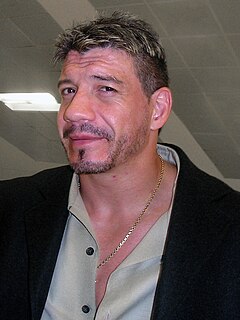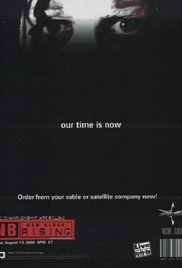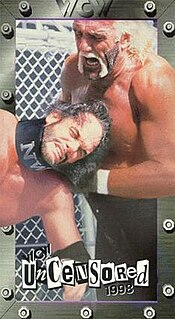Related Research Articles

Eduardo Gory Guerrero Llanes was an American professional wrestler. He was a prominent member of the Guerrero wrestling family, being the son of first-generation wrestler Gory Guerrero.

Salvador "Chavo" Guerrero IV better known by ring names Chavo Guerrero and Chavo Guerrero Jr., is an American professional wrestler and promoter who is currently signed to All Elite Wrestling (AEW). He has previously worked for World Championship Wrestling (WCW), World Wrestling Federation/Entertainment (WWF/WWE), Total Nonstop Action Wrestling (TNA), Lucha Underground (LU) and Nación Lucha Libre (NLL).

Debrah Ann Miceli, better known as Madusa, is an Italian-born American monster truck driver and former professional wrestler. As of 2015, she has been the commissioner of Japanese promotion World Wonder Ring Stardom. In professional wrestling Miceli is also known by the ring name Alundra Blayze, which she used while in the WWF/WWE. Outside of the WWF, she wrestled under her professional name of Madusa, which was shortened from "Made in the USA". Her early career was spent in the American Wrestling Association, where she once held the AWA World Women's Championship. In 1988, she was the first woman to be awarded Pro Wrestling Illustrated's Rookie of the Year. The following year, she signed a contract with All Japan Women's Pro-Wrestling, making her the first foreign wrestler to do so.

The World Championship Wrestling (WCW) Hall of Fame was an American professional wrestling hall of fame maintained by World Championship Wrestling (WCW). It was established in 1993 to honor wrestlers who began their careers long before the 1990s, mostly alumni of the National Wrestling Alliance (NWA) and Jim Crockett Promotions (JCP), the predecessors of WCW. Inductees received commemorative plaques that had their names & portraits inscribed on them. Wrestlers were inducted by Gordon Solie, a senior commentator in professional wrestling, and received their plaque during the "Legends Reunion" segment at WCW's May pay-per-view event, Slamboree. The WCW Hall of Fame was the second hall of fame established to honor professional wrestlers, after the creation of the World Wrestling Federation (WWF) Hall of Fame in February 1993. After the 1995 Hall of Fame ceremony, WCW stopped the production of the Hall of Fame without a formal announcement. In 2001, the WWF acquired all of its assets; this led to the formal stoppage of the WCW Hall of Fame. The WWF, however, stopped producing its Hall of Fame ceremony after 1996. In 2004, World Wrestling Entertainment (WWE), the WWF's successor, reinstated the WWE Hall of Fame, which included inductees that were alumni of WWE, NWA, JCP, and WCW.

New Blood Rising was a professional wrestling pay-per-view (PPV) event produced by World Championship Wrestling (WCW). It took place on August 13, 2000 from the Pacific Coliseum in Vancouver, British Columbia. The name is a reference to the New Blood faction within WCW. The event replaced WCW's August PPV event Road Wild held from 1996 to 1999 and was held on a Sunday instead of a Saturday. Despite never being announced before or during the show, every match on the card was contested under no disqualification rules. In 2014, All WCW pay-per-views were made available on the WWE Network.
The Faces of Fear was a professional wrestling tag team of The Barbarian and Meng in World Championship Wrestling (WCW) that existed between 1996 and 1999. The two were first paired together in the World Wrestling Federation (WWF) as part of The Heenan Family, a villainous faction, where Meng was known as Haku. In WCW, they teamed together regularly as members of the Dungeon of Doom. They appeared on several WCW pay-per-view events but did not receive a push from the promotion and were unsuccessful in their matches for the World Tag Team Championship. The team split up after The Barbarian turned on Meng in 1998 and they feuded with each other throughout the year. They briefly reunited in 1999 before Barbarian turned on Meng again and the team dissolved.

WCW Saturday Night is a weekly Saturday night TV show on TBS that was produced by World Championship Wrestling (WCW). Launched in 1971 initially by Georgia Championship Wrestling, the program existed through various incarnations under different names before becoming WCW Saturday Night in 1992. Although initially the anchor show of the Turner Broadcasting-backed wrestling company, the September 1995 premiere of WCW Monday Nitro airing on sister station Turner Network Television usurped the show's once preeminent position in the company, as the primary source of storyline development and pay-per-view buildup.

When Worlds Collide was a professional wrestling pay-per-view (PPV) event that took place on November 6, 1994, at the Los Angeles Memorial Sports Arena in Los Angeles, California. It was scripted and produced by the Mexican lucha libre company Asistencia Asesoría y Administración (AAA), now known as Lucha Libre AAA Worldwide, and their American partner, International Wrestling Council (IWC). The show was produced by the technical staff of World Championship Wrestling (WCW). WCW Executive Vice-President Eric Bischoff had helped AAA secure the show to be broadcast by American pay-per-view providers, marking the first time a non-US-based wrestling promotion was shown live on US PPV television. The show was broadcast in both English and Spanish. Chris Cruise and Mike Tenay called the action in English, while Arturo Rivera and Andrés Maroñas handled the Spanish announcing. This event also marked Tenay's first commentating role in professional wrestling. It is one of the few pay-per-view events not made available for streaming on the WWE Network service.

The Great American Bash was a professional wrestling pay-per-view (PPV) event produced by World Wrestling Entertainment (WWE). It was the first Great American Bash event produced under WWE, but the fifteenth overall, as the event was previously promoted by World Championship Wrestling, which WWE acquired in 2001. The event took place on June 27, 2004, at the Norfolk Scope in Norfolk, Virginia and featured wrestlers from WWE's SmackDown! brand division. Three of the eight matches on the card were contested for a championship; one was lost while the other two were retained. The event grossed $325,000 with 6,500 ticket sales and received a 0.47 buyrate.

The Great American Bash was a professional wrestling pay-per-view (PPV) event produced by World Wrestling Entertainment (WWE). It was the second Great American Bash under WWE, and 16th overall. It took place on July 24, 2005, at the HSBC Arena in Buffalo, New York. The event featured wrestlers and other talent that performed on the SmackDown! brand division.

Road Wild (1999) was the fourth and final Road Wild professional wrestling pay-per-view (PPV) event produced by World Championship Wrestling (WCW). It took place on August 14, 1999 from the Sturgis Motorcycle Rally in Sturgis, South Dakota.

Beach Blast (1993) was the second annual Beach Blast professional wrestling pay-per-view (PPV) event produced by World Championship Wrestling (WCW). It took place on July 18, 1993 at the Mississippi Coast Coliseum in Biloxi, Mississippi. In the main event the team billed as "the Superpowers" faced a team nicknamed "the Masters of the Power Bomb" as part of a longer running rivalry between the two sides.

Uncensored (1996) was the second Uncensored professional wrestling pay-per-view (PPV) event produced by World Championship Wrestling (WCW). The event took place on March 24, 1996 from the Tupelo Coliseum in Tupelo, Mississippi. As of 2014 the event is available on the WWE Network.

Road Wild (1997) was the second Road Wild professional wrestling pay-per-view (PPV) event produced by World Championship Wrestling (WCW) and the first to be produced under the Road Wild name. It took place on August 9, 1997 from the Sturgis Motorcycle Rally in Sturgis, South Dakota.

Road Wild (1998) was the third Road Wild professional wrestling pay-per-view (PPV) event produced by World Championship Wrestling (WCW) and co-promoted by WCW and nWo in storyline. It took place on August 8, 1998 from the Sturgis Motorcycle Rally in Sturgis, South Dakota. The event also featured a mini-concert by Travis Tritt after the wrestling matches.

Hog Wild was a professional wrestling pay-per-view (PPV) event produced by World Championship Wrestling (WCW) and the first in the Road Wild chronology. It took place on August 10, 1996 from the Sturgis Motorcycle Rally in Sturgis, South Dakota. The event took place on Saturday, instead of taking place on the usual Sunday for pay-per-view events. The event was also notable for being the first pay-per-view event in WCW after the formation of the nWo at the previous month's Bash at the Beach.

Halloween Havoc (1998) was the tenth Halloween Havoc professional wrestling pay-per-view (PPV) event produced by World Championship Wrestling (WCW). It took place on October 25, 1998 from the MGM Grand Garden Arena in Las Vegas, Nevada.

Uncensored (1998) was the fourth Uncensored professional wrestling pay-per-view (PPV) event produced by World Championship Wrestling (WCW). The event took place on March 15, 1998 from the Mobile Civic Center in Mobile, Alabama. As of 2014 the event is available on the WWE Network.
References
- ↑ Guerrero, Eddie (2005). Cheating Death, Stealing Life: The Eddie Guerrero Story . Simon and Schuster. p. 137. ISBN 0-7434-9353-2.
- ↑ O'Donnell, Art (July 25, 2013). "Induction: The Self-Destruction of the Ultimate Warrior: A Lesson in Professionalism from WWE's Spiteful Owner". WrestleCrap . Retrieved November 30, 2014.